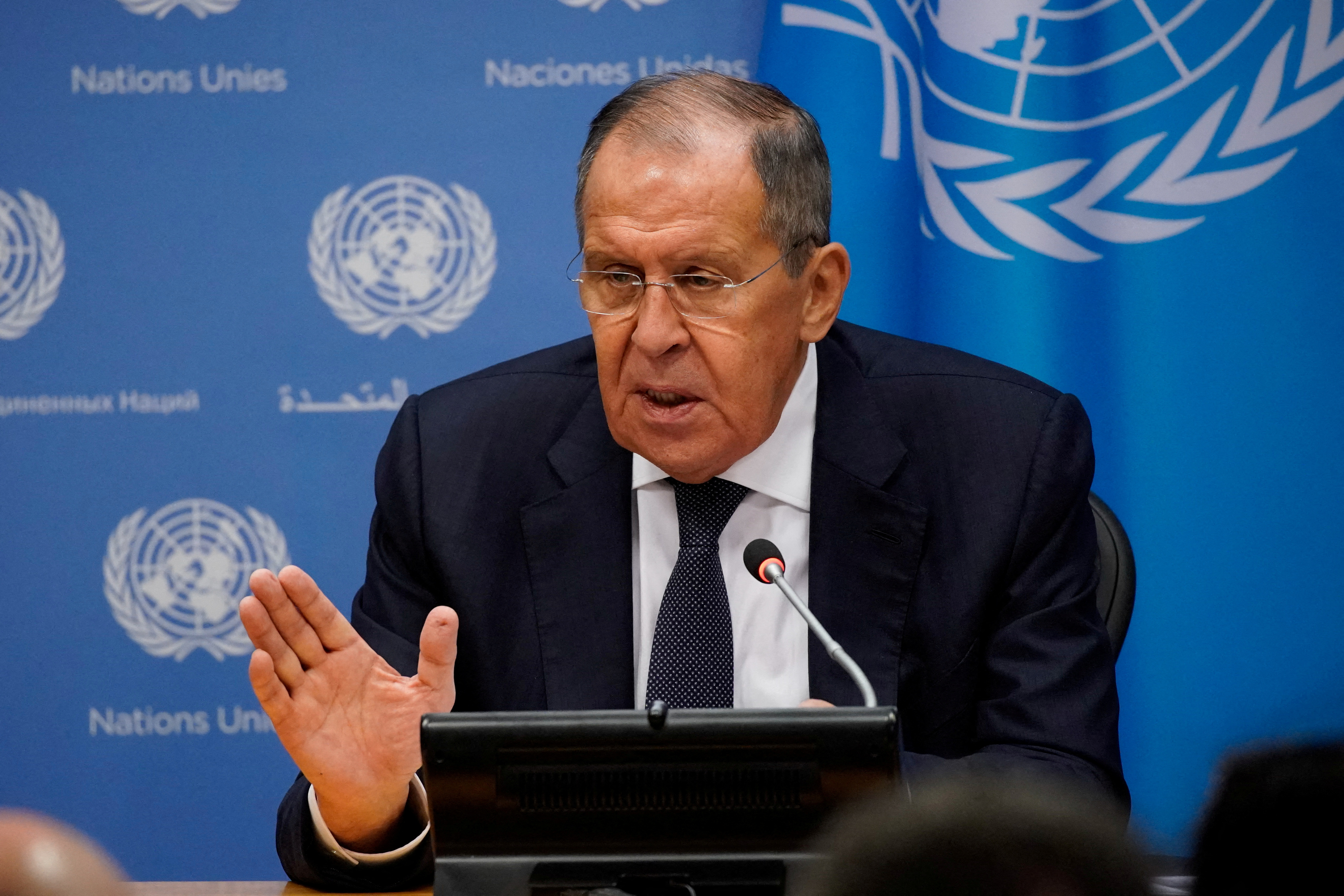
Russia’s Foreign Minister Sergei Lavrov has called the West an “empire of lies” and accused it of adopting a neo-colonial mindset in its overtures to the Global South to win backing for Ukraine in the war.
Speaking after a week of intense global diplomacy at the annual gathering of world leaders at UN headquarters in New York, where Ukraine and its Western allies sought to drum up support for Kyiv as it fights against Russia’s invasion, Lavrov said a “global majority” was being duped by the West.
“The US and its subordinated collective continue to fuel conflicts which artificially divide humanity into hostile blocks and hamper the achievement of overall aims,” Lavrov said.
“They are trying to force the world to play according to their own self-centred rules.”
James Bays, Al Jazeera’s diplomatic correspondent, said Lavrov’s speech was part of a “tour around the world of Russia’s views” that contained no real mention of Ukraine and few indications of Moscow’s plan one year into the conflict.
During a news conference following the speech, the foreign minister dismissed a 10-point proposal put forward by Ukraine’s President Volodymyr Zelenskyy, as well as the latest UN proposals to revive the Black Sea grain initiative.
“It is completely not feasible,” he said of the peace blueprint promoted by Kyiv. “It is not possible to implement this. It’s not realistic and everybody understands this, but at the same time, they say this is the only basis for negotiations.”
He also said the UN proposal would not fly because the West did not deliver on its promises to Moscow, including removing sanctions on a Russian bank and reconnecting it to the global SWIFT system.
The February 2022 invasion of Ukraine triggered trade disruptions and significant increases in international prices for energy, agricultural commodities, and fertiliser, which were already elevated due to the effects of the COVID-19 pandemic.
Russia’s foreign minister placed the blame for the crises in the food and energy markets on Western nations, who impose “unilateral coercive measures” – or sanctions – on weaker ones.
Lavrov’s speech came as Zelenskyy awarded two Polish volunteers state awards during a stopover, as relations between the two countries are strained over grain imports. He did not meet with any officials.
Zelenskyy angered his neighbours when he told the UN General Assembly that Kyiv was working to preserve land routes for grain exports, but that the “political theatre” around imports was only helping Moscow.
Poland decided last week to extend a ban on Ukrainian grain imports, shaking Kyiv’s relationship with a neighbour that has been one of its staunchest allies since Russia invaded Ukraine in February last year.
Zelenskyy thanked all Poles who “from the first days opened their families, their homes, opened themselves up and helped”.
“I believe that any challenges on our common path are nothing compared to the fact that there is such strength between our people,” he said.
Continuing fighting
Ukraine is continuing a counteroffensive to repel the Russian invasion and recapture its lost territories. On Saturday morning, it launched another missile attack on Sevastopol on the occupied Crimean Peninsula, a day after an attack on the headquarters of Russia’s Black Sea Fleet that left a serviceman missing and the main building smouldering.
Ukraine’s intelligence chief, Kyrylo Budanov, told Voice of America on Saturday that at least nine people were killed and 16 others wounded as a result of Kyiv’s attack on the Black Sea Fleet on Friday.
Budanov claimed Alexander Romanchuk, a Russian general commanding forces along the key southeastern front line, was “in a very serious condition” following the attack.
Al Jazeera’s Zein Basravi, reporting from Kyiv, said Ukraine’s military intelligence confirmed the death toll. At least two senior generals were wounded, while the fate of the head of the Russian Black Sea navy, Viktor Sokolov, remained unknown.
Russia did not confirm the number of casualties.
Crimea has served as the key hub supporting Russia’s full-scale invasion of Ukraine. Sevastopol, the main base of Russia’s Black Sea Fleet since the 19th century, has had a particular importance for navy operations since the start of the war.
Hanna Shelest, a security analyst with the Ukrainian Prism NGO, said Kyiv’s attacks on Crimea were important for its strategy and morale.
The majority of the attacks on Ukraine’s southern region come from Crimea, and moves to diminish the capabilities there have strategic importance, Shelest told Al Jazeera.
Ukraine’s military said the air force conducted 12 attacks on the Black Sea Fleet headquarters on Friday, targeting areas where personnel, military equipment and weapons were concentrated. It said that two anti-aircraft missile systems and four Russian artillery units were hit.
Ukraine has increasingly targeted naval facilities in Crimea in recent weeks while the brunt of its counteroffensive makes slow gains in the east and south of Ukraine.







